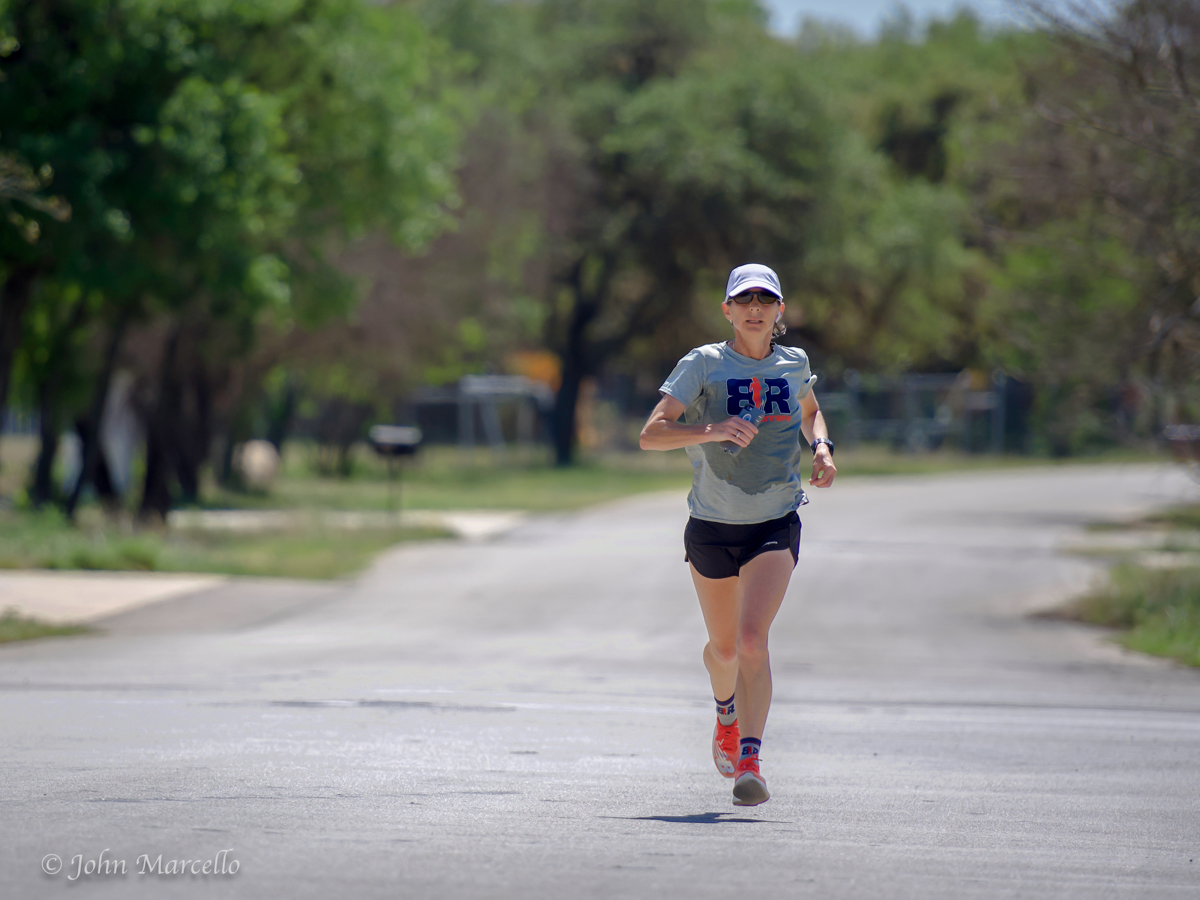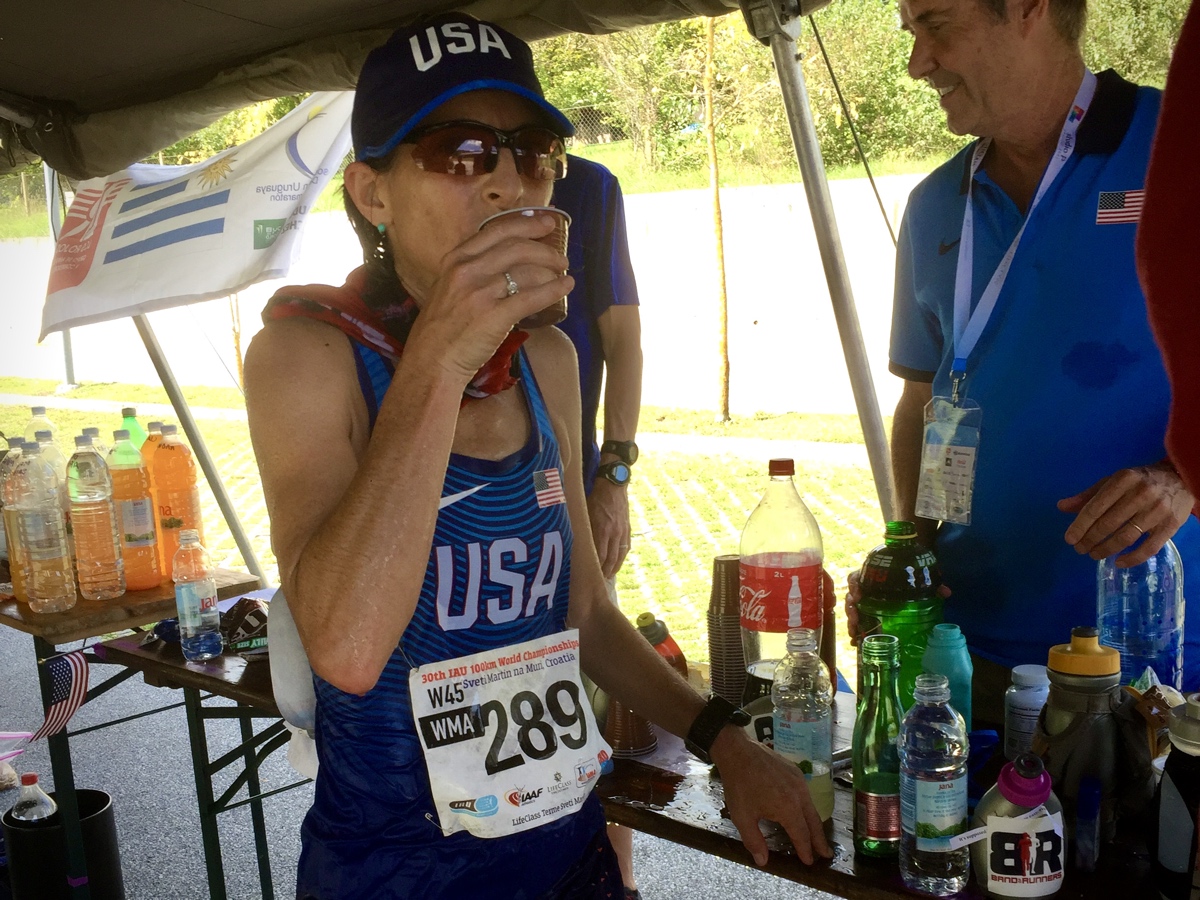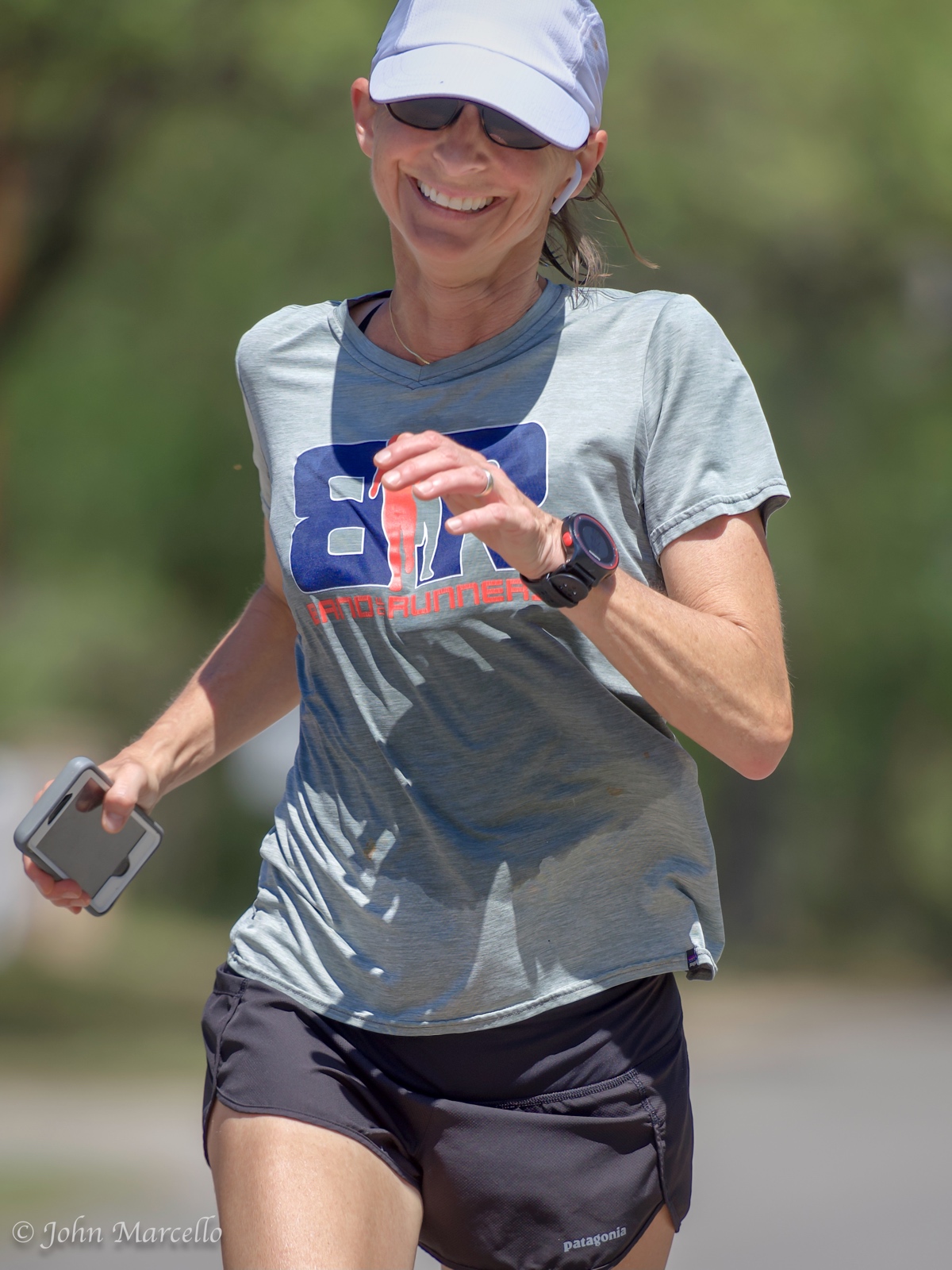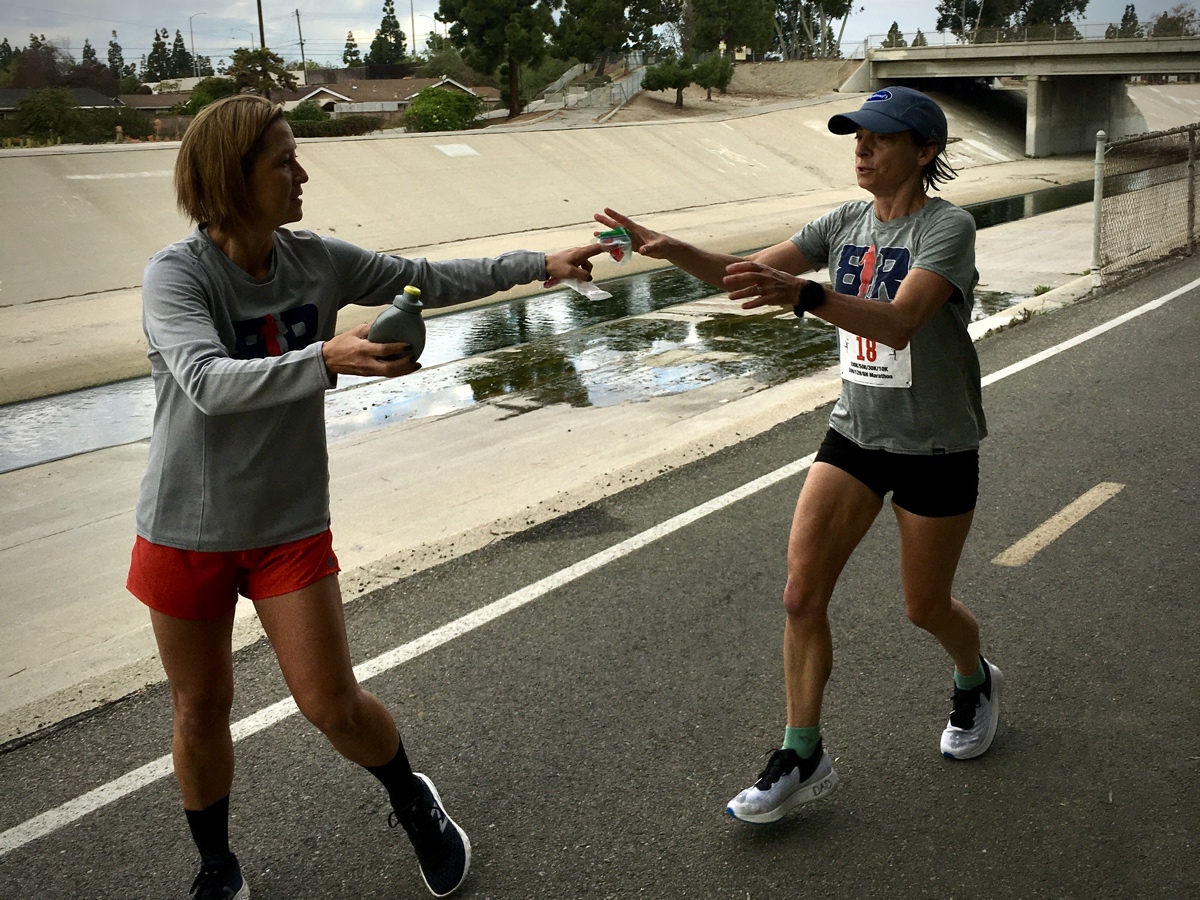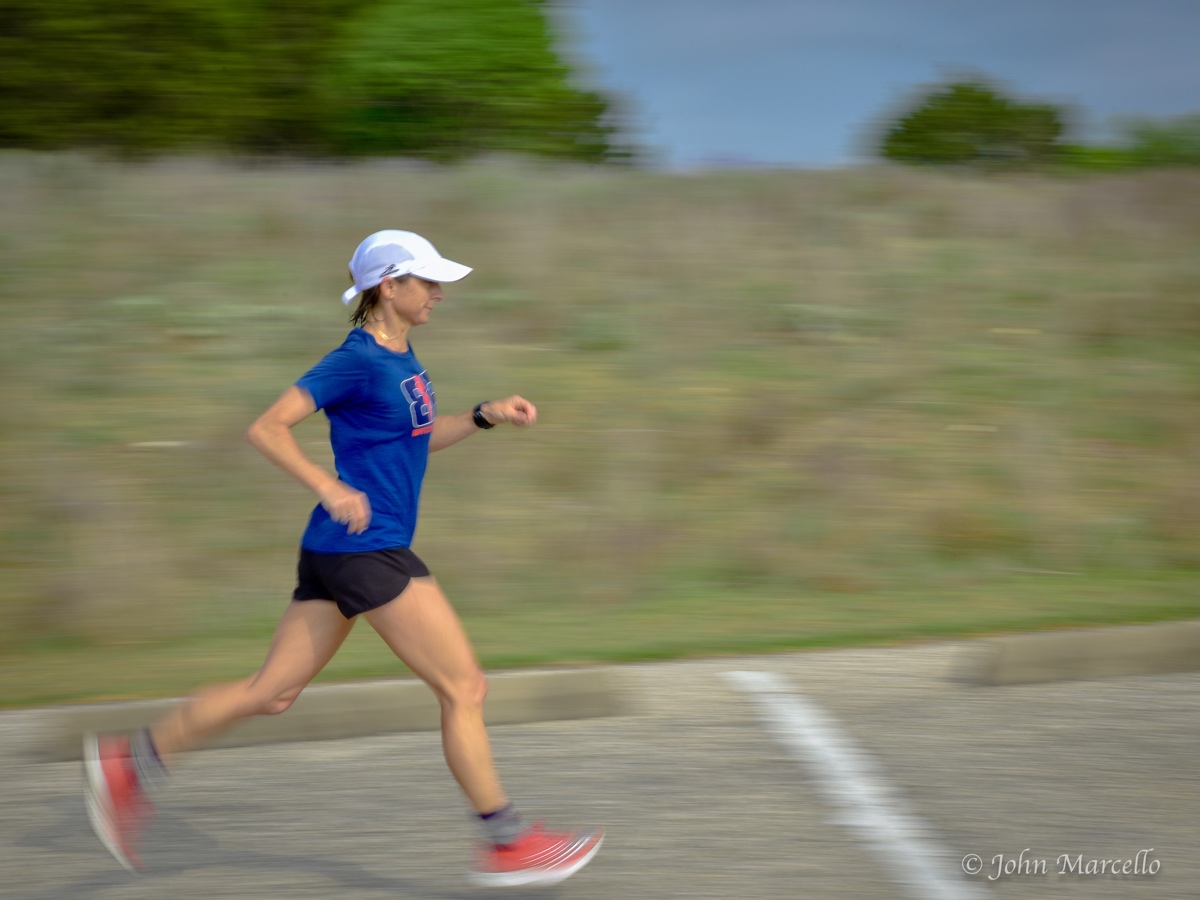“Age-Old Runners” is an article series where we explore runners’ performance potential after the age of 45 by interviewing excellent middle-aged runners. Is there still potential to improve? What roles do motivation, mindset, and specific training and recovery techniques play in allowing runners in their mid-forties to mid-sixties to continue to excel? To learn more about this series’ goals, check out its introductory article.
After over a year and half, 18 interviews of excellent age-group runners, and an emblematic photo gallery, we’ll transition this series into its next iteration. iRunFar’s Liza Howard will still author stories of age-group runners each month, just in a different way. Stay tuned!
Before we close the book on this version of “Age-Old Runners,” we turn the tables on this column’s fearless leader, Liza Howard, herself a decorated age-group athlete. The 49-year-old is a runner, coach, wilderness first aid instructor, nonprofit leader, mom, and an almost-decade-long member of the iRunFar team.
The following is a transcript of a Zoom interview with Liza. It has been edited for brevity and clarity.
You’re an adult-onset runner, but I think you’ve run for quite some time?
I started running after college, so, yes, that’s a long time. [laughs] I ran my first marathon when I was 23 or 24. I cut a training plan out of Runner’s World magazine. I still have it. You know, the one with beginner/intermediate/advanced all on one page. I put it on the fridge and followed it to the letter. I ran the Philadelphia Marathon.
There was a really nice group of folks at a running shop in Virginia Beach, Virginia, where I lived. They were wonderful, and there was peer pressure, and I ended up running a bunch of marathons after that.
At what point did you learn that you were decent at running?
I qualified for the Boston Marathon on my first marathon without knowing what Boston was or what qualifying for it meant. As I was nearing the finish, struggling and cramping, people were yelling, “You’re going to qualify!” I was like, “I don’t know what you’re talking about!” So I had some facility for running long from the start. No one was more surprised than me.
How did you find trail running and ultrarunning?
When I was working for the National Outdoor Leadership School (NOLS), a friend and co-worker suggested we do an adventure run after we finished teaching for the summer. We ran the Grand Canyon Rim-to-Rim to-Rim.
The next summer he said, “Let’s do a trail race.” I don’t know what I placed, but I got a car-seat cover, and it’s been the best prize that I’ve ever gotten. I still use it. Then it was kind of like, off to the races, a little bit.
I fell in with the San Antonio, Texas trail running crowd, where I live now. When I moved to San Antonio, I was really lonely, not working NOLS courses anymore, and I had a new baby. And so when they said, “We’re training for a 50k. You want to do it?” I was like, “Yeah, let’s do a 50k.” Then they said, “Hey, we’re doing a 50 miler.” Then it was, “Bandera 100k is in January. We’re all doing it.” I responded, “I don’t even know how long that is. That sounds fine.”
I ended up being okay at it. It was a sweet little pat on the back when the rest of my life was a disaster. I didn’t know what I was going to do professionally. I wasn’t talented at being a mother of a baby. But, I thought, Here’s one thing that I’m not bad at.
I went up to 100 miles really fast and pretty much stayed there. I ran the Bandera 100k a lot, but otherwise it was just 100-mile races.
What are you currently training for?
I’m running the Keys 100 Mile on May 15.
Wow! Why the Keys 100?
If you win the Keys 100 Mile, you get a spot in the Badwater 135. I would like to run Badwater in order to coach people to run Badwater. Also, if the race goes sideways, you’re still in the Florida Keys.
Is your 100-mile PR of 15:07 going down at Keys?
I sure hope so, but it’s mighty hot and humid there, so who knows? My goal is that gorgeous belt buckle.
When you started writing this series a year and a half ago, your marathon PR was 2:54 and you said you wanted to try and progress it. Has that happened?
No. Everything got canceled [because of the COVID-19 pandemic].
Do you still think about your marathon PR?
I do. The pandemic was not the time for me to train for it. I ran a lot, but I learned that I need to run with people who are faster than me in order to push myself really hard. I also need to go to a marathon with friends, or it’s too easy for me to decide not to race.
What is your training like? And has your training changed over the last 10 years?
Like most of the age-group folks I’ve interviewed in this series, I dot my i’s and cross my t’s much more than before. I get seven or eight hours of sleep. I do yoga now. It’s really more glorified stretching. [laughs] I do core work and some strength work. Before I could get away without any of that.
My volume is the same. I’m more consistent about maintaining 70-mile-per-week volume.
I’m also a lot more consistent with speedwork, which I didn’t do before. When I was in my twenties and thirties, I would just run with whoever was running and do whatever they were doing. And I could maintain a moderate pace without having to make moderate feel easy. It just felt easy. Now speedwork is necessary for me to maintain where I want to be running in a way that it wasn’t previously. So that’s different.
Yoga has made such a difference in how easily I can walk around after long runs, get in and out of the car, and just feel good the next day without little aches and pains. That’s made a big difference. I’m doing that at least 30 minutes a day. I’m trying to make it longer, but my low-grade hatred for it interferes. [laughs]
Strength work is only 12 minutes at a time. I do it every day except Sundays. It’s bodyweight-type stuff—box jumping and things like that. But 12 minutes is my commitment, which feels like it’s useful enough right now.
How do you feel about talking about food and eating? Is that an okay area to talk about? What types of food do you eat?
This is a dish of jellybeans I’m holding right here. I’m super happy to talk about it. I’ve got my jellybeans and coffee. Let’s go. [laughs]
I try to avoid sugar, but sometimes it finds me. [laughs and points at jellybeans] Sugar really affects my mood, creating energy and mood swings. I’m more even keeled if I’m not eating sugar. That’s good for my husband Eliot, the kids, and anybody who has to deal with me.
Otherwise, I eat everything. When you take sugar out of the mix, that takes a lot of processed food off the table, and I think that helps me eat in a way that fuels my running better. If I’m not stuffed full of ice cream and Flamin’ Hot Doritos, I’m more likely to eat broccoli. It’s a useful handrail. I’m not absolutist about it. Overall, I’ve felt a little stronger when running with a cleaner diet.
Do you see yourself as competitive?
I guess with myself. I like working really hard and pushing myself. But I don’t like to race. [laughs] It’s very stressful.
Has your internal competitor evolved as the years go by?
There’s still the same desire to see what my particular body is capable of. And, you know, as my body gets older, [laughs] to see what’s possible. I think pushing really close to the edge, doing the hard training, and being scared by it is really useful to me still.
Why did you want to do this article series?
Initially, it was self-interest. I’d read a lot of writing by runners who were about my age and who seemed to be mourning their loss of speed. They wrote about making peace with their current abilities and trying not to judge their running based on their past performances. I admire that mindset wholeheartedly.
At the same time, I felt that I could still be a better runner. And I wanted to try to be. But all the talk of slowing down started to make me question myself and my goals.
So, I wanted to see what other runners’ experiences were. Are we underestimating our bodies’ potential? When should we expect to stop improving?
What did you learn from asking these questions of other age-group runners?
For a lot of folks, there’s this cognitive dissonance between their age and how they feel, “I don’t feel like I’m 60. I don’t feel like I’m 70. I feel like I’m me.” A lot of the runners also talked about being surprised by their slower paces. “I don’t feel like I’m running slower, but the watch tells me I am.”
Everybody who was still racing, loved racing either against other runners or themselves. That seems like a no-brainer. If they didn’t love it, they wouldn’t be doing it, right? But I think there’s a misperception about what motivates age-group runners.
There’s also baggage associated with aging. Just this morning, my seven-year-old asked how old I was, and when I told her 49, she said she promised she wouldn’t tell her teacher I was that old. I told her she could tell anybody she liked how old I was and that I was happy to have made it this many years along.
Still, the cultural expectations about what’s physically possible are a lot to carry around while you’re training. The message “your time is over” becomes harder and harder not to believe.
Those cultural expectations, are you reflecting on general society or the trail running and ultrarunning community?
Both. But in trail and ultrarunning, specifically, that message is reflected in the lack of coverage of age-group racing.
We don’t know what older runners are doing and what they’re capable of doing. I think this has a big impact on the goals people set for themselves. If you see a bunch of folks doing these extraordinary things, you’re going to think, My body’s not that much different. Certainly, genes and luck play a role, but in general, if you’re healthy then your body is probably capable of something similar.
What have you learned about what trail running and ultrarunning can do to reduce ageism in our sport? One theme that emerged from this series is doing a better job of honoring age-group runners at races. Everyone you interviewed said they’d like to see more of this.
Yeah. It seems like making the age-group records front and center is more important to folks than prizes. The attention makes the records important, right? I think that would have a powerful impact. It might keep more older runners in the sport, or bring more in, and it might encourage more folks to give trail running a try.
And coverage of age-group racing is important too. We need to figure out the way to cover this racing when there’s not much actual competition in person. If there are only two 65-year-old women racing, say, how do you cover the race against the clock? Bob Becker is doing his fourth Badwater this year at age 75, and he’s going for a PR. If he does, he’ll set the age-group record by 13 hours. How do we cover that race?
Age-group runners definitely get the attention of younger people and the media when they compete well against younger people. While that’s amazing, how do we get people to care about the inherent value of age-group running?
People are drawn in by exciting racing, so a key part is putting runners’ goals and times in perspective. You need to know what the record is for 60-to-64-year-olds at a race like the Western States 100 and how long it’s stood. That knowledge helps.
Then you have to care about the folks going after those records. The more people know about individual runners’ lives, the more they’ll be inclined to follow them. Really, it’s the same reason we follow anyone. “Who do I admire or feel a connection with?”
Do you think you’re ending this interview series with a different “why” than when you started?
I started off believing I had the potential to improve and that many runners underestimate their abilities. I was looking for examples that would support my beliefs. I hoped the interviews would inspire both me and other runners to set exciting goals for ourselves. I hoped the stories and experiences of other runners might decrease the impact of the “too old” messages we hear.
My why did not change, but I started to prioritize the conversations and getting to know people’s stories more than I did fleshing out exactly how much potential for speed exists as we age and where that particular inflection point is. The series broadened my idea of potential and that exciting racing exists outside of the fastest overall.
I was kind of hoping to find some sort of magical elixir that everyone was using. “Oh look, everyone’s drinking a cup of maple syrup in the morning. I’ll do that.” [laughs] But the elixirs seem to be excitement and joyfulness—about racing, the community, and pushing themselves.
Why should everyone care about age-group running?
You should care because if you love age-group running now, then you’re going to love it later. And, that being the case, it’s good to know that you’re still capable of doing exciting things. It’s not going to be this unrequited love. If you love the competition, racing, and community, that’s still totally there.
You should care because the more you know about the racing and feats that others are doing, the more hopeful you will feel about your running future. It is a hopeful thing to see somebody who’s 20 or 30 years older than you still doing hard stuff. It can certainly help put bad days or races in perspective. “Yeah, I had a crappy training season but I’ve got 20 years to get my act together.” That’s hopeful. That’s a thing to hold on to.
Training specifics:
- Weekly running volume: Consistently 70 miles per week, more before big races
- Strength training: Core work, bodyweight strength work, and yoga for about 30 minutes per day in small, organized bouts in the garage or with online videos
- Off-season: Not really
- Sleep: Seven hours per night
- Race nutrition: Liquid nutrition, like Skratch, with some jellybeans mixed in
- Recovery: Cat naps whenever I can
Three factors Liza attributes her running performance to:
- Genetic good fortune
- A wonderfully supportive family
- Love of running
Call for Comments
Calling all Liza Howard stories and praise! It’s time to celebrate Liza and all she does for the running community. You know what to do in the comments section.
